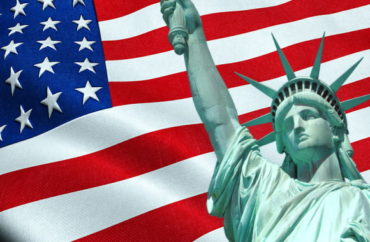
Presents an alternative to the ‘Zinn narrative’
WASHINGTON — The teaching of American history is only one of the many culture war battles underway within classrooms across the country, but for one historian, it is a personal fight for the preservation of a nation.
Wilfred McClay, a history professor at the University of Oklahoma, has authored a new textbook on American history that tells the “great narrative” that a “great nation needs and deserves.”
McClay emphasizes his textbook, published in May and titled “Land of Hope: An Invitation to the Great American Story,” is a telling of American history that neither downplays nor overemphasizes the faults and triumphs of the nation.
The American narrative must be accurately passed on for the nation as a whole to preserve itself into the next generation, he said at an event Dec. 16 at the American Enterprise Institute focused on the textbook.
Americans are “losing a general grasp of our own history in the classroom,” the historian said.
“It has to be truthful to be convincing,” he said.
The most prevalent telling of American history that McClay is trying to counter is Howard Zinn’s “People’s History of the United States,” a 1980 history textbook that has faced much criticism for its emphasis and exaggeration on the sins committed throughout American history while ignoring or downplaying its positive influences.
The book is required reading at many colleges, universities and high schools throughout the country. “Land of Hope” aims to replace it.
“History is a reservoir of shared memories,” McClay said, adding that a telling of history must “teach us how to balance criticism with appreciation.”
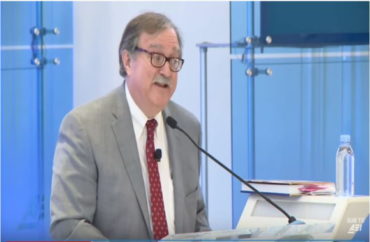
In his remarks at AEI, McClay highlighted certain moral failures in American history, including slavery and even the posthumous judging of the use of the atomic bomb, and noted that “history is not a Hollywood movie.”
The veteran historian related how he has encountered students who think it is “lunacy” that slavery is not a uniquely American fault. He said some students don’t consider how slavery, racism and prejudice existed long before the founders wrote the Declaration of Independence and the Constitution.
“The challenge of presenting slavery is the need for balance,” McClay said, balancing the description of the severity of it “without overemphasizing the lasting impact.”
One serious question McClay noted is how to deal with the “failure of the Constitution’s framers to deal with the problem” while drafting the constitution.
Quoting from the book, McClay said: “There is no easy way to answer such questions. But surely part of the answer is that each of us is born into a world we did not make. And it is only with the greatest effort and often at very great cost that we are ever able to change that world for the better.”
“Part of the study of history involves the imagination, learning to see historical actors as speaking and acting in their own time rather than ours, and learning to see our heroes as an all too human mixture of admirable and unadmirable qualities. People like us who may like us be constrained by circumstances beyond their control,” he continued.
“What we need to understand is how the original compromise no longer became acceptable to increasing numbers of Americans, especially in one part of the union, and why slavery, a ubiquitous institution in human history came to be seen not only as an unfortunate evil, but as a sinful impediment to human progress, a stain upon the whole nation.”
The veteran academic expressed concern that there is “a genuine danger that slavery will be taught as part of America’s enduring makeup” and that it was a principle upon which the nation was founded.
We live today on the other side of a great transformation in moral sensibility, a transformation that was taking place but not yet completed in the very years the united states was being formed. Hence it would be profoundly wrong, as some do, to say the United States was founded on slavery. No, it was founded on other principles entirely, on principles of liberty and self rule that had been discovered and defined and refined and enshrined through the tempering efforts of several turbulent centuries of European and British and American history.
“The United States enjoyed a miraculous birth, but was not the product of an unstained conception and an untroubled delivery,” he said.
Another often debated question is the use of the atomic bombs by President Harry S. Truman at the end of World War II, a debate, like slavery, that McClay said he believes is often thought of in a modern context, and not within the context of the time and situation where it occurred.
“In today’s debates over the morality of using such [nuclear] weapons, we fail to contextualize the time,” the professor said.
“In times like ours when institutions are being replaced, political thought has to look backwards as well as forwards,” McClay said. Later he added that “the wisdom of the statesman may not be understood by contemporary observers.”
McClay is the G.T. and Libby Blankenship professor in the history of liberty at the University of Oklahoma. He received his Ph.D. in history from Johns Hopkins University. He has also taught at the University of Tennessee at Chattanooga, Tulane, Georgetown and Pepperdine, and served for 11 years as a member of the National Council on the Humanities.
He is also author of “The Masterless: Self and Society in Modern America” and “The Student’s Guide to U.S. History.”
MORE: Howard Zinn lied about Christopher Columbus. Here’s how.
MORE: How a decades-old syllabus inspired ‘the hardest course you’ll ever take’
IMAGE: Donfiore / Shutterstock
Like The College Fix on Facebook / Follow us on Twitter

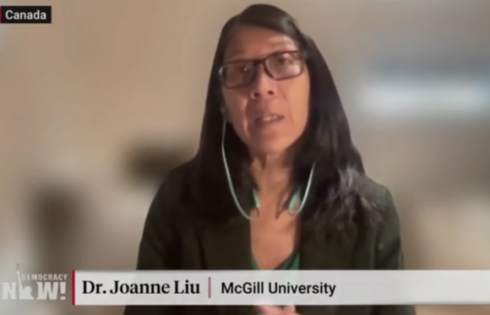
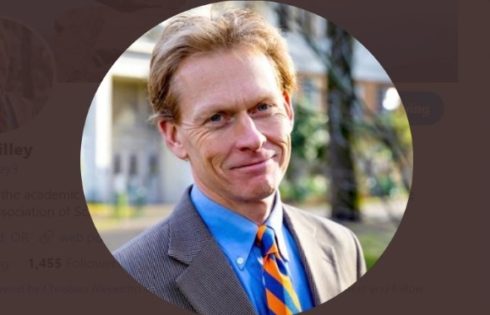
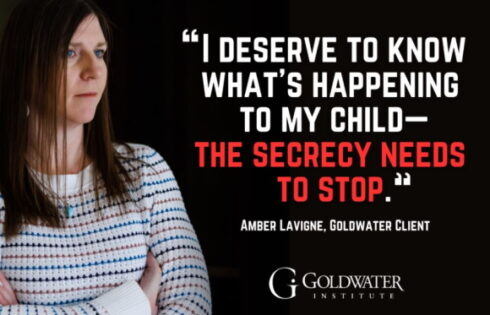

Please join the conversation about our stories on Facebook, Twitter, Instagram, Reddit, MeWe, Rumble, Gab, Minds and Gettr.